In India’s ongoing socio-economic advancement, the issue of women’s safety remains a critical concern. Persistent challenges such as high rates of violence, entrenched gender discrimination, and inadequate law enforcement necessitate comprehensive solutions. Recognizing this urgency, the Government of India has launched the ‘Safety of Women’ Umbrella Scheme. With a significant budget allocation and a range of strategic components, the initiative aims to bolster emergency response systems, enhance forensic capabilities, combat cybercrimes, and strengthen support mechanisms for women in distress.
India, despite its rapid socio-economic progress, continues to grapple with significant challenges concerning women’s safety. Some of the persistent issues include:
High Incidence of Violence
Women across various age groups and socio-economic backgrounds face threats of physical, sexual, and emotional violence. Incidents of rape, domestic violence, sexual harassment, and eve-teasing remain rampant.
Cultural Norms and Gender Discrimination
Deep-rooted patriarchal attitudes and gender stereotypes perpetuate discrimination against women, limiting their freedom of movement, expression, and decision-making autonomy.
Inadequate Law Enforcement and Justice Delivery
Despite existing legal frameworks, the enforcement of laws pertaining to women’s safety often falls short. Cases of violence against women are frequently underreported, and survivors encounter obstacles in accessing justice due to lengthy legal procedures, lack of resources, and societal stigma.
Cybercrimes and Technological Threats
With the proliferation of digital platforms, women are increasingly vulnerable to cybercrimes such as online harassment, cyberstalking, revenge porn, and identity theft, which pose unique challenges for law enforcement agencies.
Trafficking and Exploitation
Women and girls are susceptible to trafficking for various forms of exploitation, including forced labor, sexual exploitation, and domestic servitude, fueled by poverty, lack of education, and organized criminal networks.
Importance of Laws, Justice Delivery, and Institutional Support
Stringent Legal Framework
Enactment and enforcement of laws that criminalize violence against women, provide for speedy trials, and impose stringent penalties on perpetrators are crucial for deterrence and accountability.
Accessible Justice Mechanisms
Establishment of specialized courts, fast-track procedures, and victim-friendly legal processes to ensure timely and effective redressal of grievances and rehabilitation of survivors.
Community Awareness and Sensitization
Comprehensive awareness campaigns and educational initiatives to challenge gender stereotypes, promote gender equality, and foster a culture of respect and non-violence.
Institutional Support Systems
Strengthening support structures such as helplines, crisis intervention centers, counseling services, and shelter homes to provide immediate assistance and long-term rehabilitation to survivors of violence.
Capacity Building and Training
Training programs for law enforcement officials, judicial officers, healthcare professionals, and social workers to enhance their understanding of gender-sensitive approaches, victim support, and trauma-informed practices.
Amendments in Relevant Laws
Amendments to Criminal Laws
Enactment of the Criminal Law (Amendment) Act, 2013, following the Nirbhaya case, which introduced stricter penalties for sexual offenses, expanded the definition of rape, and criminalized new forms of sexual violence.
Amendments to Evidence Act
Amendments to the Indian Evidence Act to facilitate the recording of statements of victims and witnesses through video conferencing to protect their privacy and ensure their safety.
Strengthening Cyber Laws
Amendments to the Information Technology Act to address cybercrimes against women, including the introduction of provisions on cyberstalking, online harassment, and the dissemination of sexually explicit content without consent.
Overview of the Umbrella Scheme on ‘Safety of Women’
Emergency Response Support System (ERSS) 2.0
Enhancement of emergency response mechanisms through the implementation of ERSS 2.0, enabling swift assistance to women in distress.
Upgradation of Forensic Sciences Laboratories
Modernization and strengthening of central and state forensic laboratories, including the establishment of a National Forensic Data Centre, to enhance forensic capabilities in investigating crimes against women.
Cybercrime Prevention
Initiatives to prevent and combat cybercrimes targeting women and children, including capacity building in cyber forensic techniques and the establishment of specialized units.
Capacity Building and Training
Training programs for investigators, prosecutors, and other stakeholders involved in handling cases of sexual assault and violence against women, aimed at improving investigative procedures and ensuring victim support.
Women Help Desks & Anti-human Trafficking Units
Establishment of women’s help desks in police stations and anti-human trafficking units to provide support, counseling, and legal assistance to women in distress and victims of trafficking.
Government’s Commitment
The Union Cabinet, led by Prime Minister Shri Narendra Modi, greenlights the Ministry of Home Affairs’ proposal for the ongoing implementation of the ‘Safety of Women’ Umbrella Scheme. With a total budget of Rs. 1179.72 crore spanning from 2021-22 to 2025-26, the initiative, supported by both MHA funds and the Nirbhaya Fund, aims at bolstering mechanisms across states and union territories to ensure swift response and investigation into crimes against women, emphasizing stringent deterrence and enhanced institutional support structures.
In conclusion, the ‘Safety of Women’ Umbrella Scheme represents a vital step towards addressing the multifaceted challenges of women’s safety in India. By integrating stringent legal frameworks, bolstering institutional capacities, and fostering community awareness, the initiative strives to create a safer environment for women across the nation. With the commitment of the government and collaborative efforts from various stakeholders, including law enforcement agencies and civil society, there is hope for tangible progress in ensuring the dignity, security, and empowerment of women in India.
Also Read: Empowering Communities: India’s Approach to Become Disaster Ready
